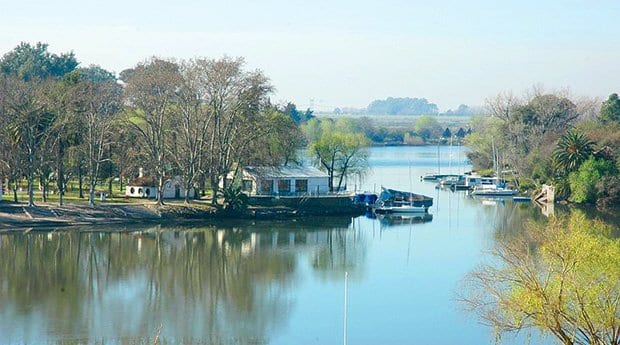Brazil does not have a monopoly on Carnival in South America. Argentina’s Gualeguaychú, a town of about 100,000 people in the province of Entre Ríos, approximately 230 kilometres northwest of Buenos Aires in the subtropical Mesopotamia region, hosts the Carnaval del Pais. The six-week extravaganza, held weekends in January, February and March (the southern hemisphere’s summer), is full of feathers, sequins, floats and a flamboyant energy quotient that should put it on every gay traveller’s wish list.
Like Rio’s parade, the main events are held in a stadium, called a corsódromo, built over what had been the town’s train station. Various comparsas, or schools, compete and are judged based on style, theme and performance, with Mari Mari and Papelitos two key competitors. Throughout the summer, nearly 500,000 tourists will come to watch or take part in the events, party in the town’s bars and swim at Nandubaysal beach, on the Uruguay River, with its view to neighbouring Uruguay. Naturally, wherever there’s an opportunity for dress-up, semi-nudity and feathers, you’ll find plenty of gays and lesbians, many coming each weekend from Buenos Aires for the festivities.
One gay tour company that sells trips to Gualeguaychú is BueGay, based in Buenos Aires and run by Alfredo Ferreyra, who is also the Argentine representative for the International Gay and Lesbian Travel Association (IGLTA). Ferreyra’s company offers weekend or one-day tours; it can procure tickets for events and can provide English-speaking tour guides.
A frequent visitor to Gualeguaychú himself, Ferreyra says, “North Americans should visit Gualeguaychú to get acquainted with local culture and a different carnival from the one of Rio.” He adds that while Carnaval del Pais might not be as large as the more famous Brazilian event, it is still “quite outstanding” and offers a welcome change for tourists, many of whom limit their Argentine visit to Buenos Aires, perhaps adding only Mendoza or Iguazu Falls to their itineraries.
There are a few gay-friendly places in Gualeguaychú, but the most famous is El Angel, an important part of Argentina’s recent queer-rights history: it’s the drag bar where transgender performer Florencia de la V got her start. She eventually became a wealthy and powerful activist who helped spur the 2012 change in the country’s identity law, allowing those who have transitioned to change their identity cards to match their new gender. “Nowadays,” says Ferreyra, “Flor de la V is a woman according to the law and is married and has two children.” She also hosts a popular TV show and is a regular fixture in Argentina’s celebrity publications.
Beyond Carnaval, Gualeguaychú is known for the hot-spring resorts that surround the town. These, along with horseback riding at nearby estancias, or ranches, and other rural activities, are popular for longer stays. Ferreyra can arrange these, hotel rooms, house shares or other accommodations. Be aware that rental spaces are tight during the season; some people choose to go rustic by camping on the beach. The town’s proximity to Buenos Aires, and the night bus system, allow you to come, see the parades, party in the clubs afterward and hightail it back to Buenos Aires in the morning.
Gualeguaychú Tourism gualeguaychuturismo.com
Carnaval del Pais carnavaldelpais.net
Carnaval information (English) carnaval.com/argentina/gualeguaychu
BueGay Travel buegayargentina.blogspot.com
El Angel showdelangel.blogspot.com
Florencia de la V flordelave.com

 Why you can trust Xtra
Why you can trust Xtra